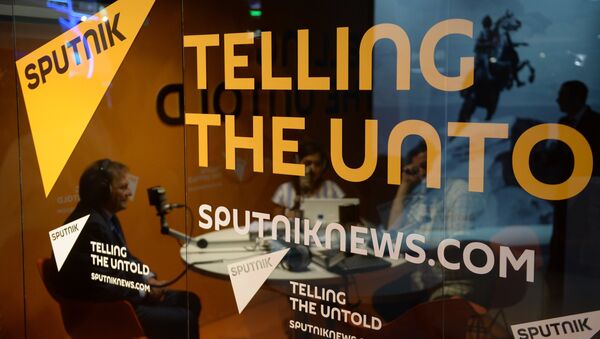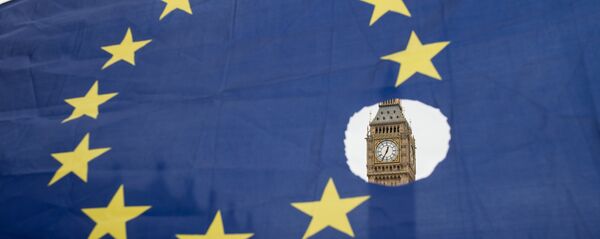The piece, "Vladimir Putin-Tied Company Given Veto Power Over Sputnik Radio Guests," by Lachlan Markay, is filled with the typical distortive, manipulative and sometimes blatantly false claims about Sputnik's editorial practices the Daily Beast is known for deploying.
Aside from its hilarious header image depicting a sinister red and black hand hacking at the Sputnik logo with a sickle — hey, we're journalists, not farmers — the article is pretty much what you expect: Russia is bad and scary.
The chief claim of the article is that Radio Sputnik requires approval from the Moscow-based international news agency Rossiya Segodnya, in that Rossiya Segodnya has the right to add or remove guests from Radio Sputnik programming, and Radio Sputnik must approve all their guests first through Rossiya Segodnya.
To his credit, before publishing the article, Markay reached out to Sputnik, requesting a comment and clarification on whether the claims were true. On the same day, Sputnik's Washington director of communications replied to the request with a comprehensive explanation, clarifying legal language that might be confusing.
"As any legal document, RIA Global's contract with Rossiya Segodnya covers various possible scenarios, including those when a potential dispute between the Contractor (RIA Global) and the Customer (Rossiya Segodnya) regarding the quality of radio shows may arise. In this case, the Customer and the Contractor would have to coordinate their efforts in order to ensure high quality of the produced radio programs. This is what the provision you mentioned refers to," Sputnik representative Beverly Hunt responded.
"However, since the signing of the contract there was no single instance when our colleagues from Rossiya Segodnya would ask RIA Global to preview guest lists, try to object to RIA Global inviting someone or insist on having certain guests. It would be especially awkward, since RIA Global's radio shows mostly broadcast live and it's hard to imagine anyone even in Washington, let alone in Moscow trying to oversee all people invited to our studios during the seven hours we broadcast live daily. Only people charged with this task are producers of individual shows, whose job it is to invite guests. If you are interested in interviewing our radio hosts or producers to speak with them directly and see what they have to say, please, let me know. I'll be happy to assist."
However, the Beast's reporter didn't seem to be interested in the comment. He already published the story, claiming that Sputnik refused to comment.
Sputnik did what the Daily Beast wouldn't and actually asked Radio Sputnik hosts about the allegations. Eugene Puryear, who has hosted By Any Means Necessary since June 2016, was asked if he has ever been requested by Rossiya Segodnya to host a guest, or told he couldn't host a guest, or made to approve a guest.
"I have never been asked to put on a guest," Puryear replied. "I've never even had a complaint about a guest before. We've had people on who were critical of Russia, but I've never heard a word from Rossiya Segodnya about anything that we've done on the show. If they have this power, it's never been used on By Any Means Necessary."
Puryear added that his colleagues in Radio Sputnik, who he works closely with, had told him much the same.
This is a common trick in journalism, unfortunately: when a writer is penning a hit piece, they may ask their target for a comment, then immediately put up the story without giving the target time to respond and write "so-and-so did not respond to requests for comment." It's technically true, of course, which is the best kind of true.
After confronted by Sputnik, the Daily Beast did amend their story to mention Hunt's comment. But they did not follow up on their original comment request by actually asking the radio show hosts if the allegation was true or not.
The article still ends with the oh-so-spooky "Sputnik did not respond to requests for comment." This despite the fact that there is a comment from Sputnik in the story, just a few paragraphs up. It's hard to even write a joke about how brazen and unscrupulous that is.
This isn't the first time our friends at The Daily Beast have published lies and half-truths about Sputnik. In November 2017, they reported that Radio Sputnik had registered as a foreign agent — it hadn't. Had they bothered to call Sputnik and ask for a comment, they would have learned that their story was false.
Sputnik will leave it up to its readers to decide which is worse: an outlet receiving a comment and pretending it didn't because the comment contradicts their narrative, or not even bothering to try.
If Mister Markay or anyone from The Daily Beast is reading this, then we once again cordially invite you to interview any of our radio show staff. You wouldn't want to engage in shady journalism like those pesky Russians, would you?







